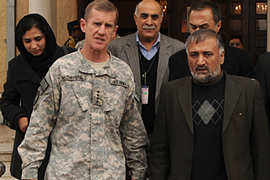McChrystal pushes Obama war plan
US commander tells Afghan MPs that results of strategy will be seen by middle of next year.

Obama announced on Tuesday that he is sending 30,000 extra troops to Afghanistan, but also said they would begin to pull out by mid-2011.
McChrystal told the MPs that the focus of Obama’s strategy was “to provide an opportunity for the Afghan people to build enough capacity to provide security themselves”.
‘Gradual withdrawal’
| In depth |
|
Analysis: Blogs: |
Al Jazeera’s Steve Chao, reporting from Kabul, the Afghan capital, who attended the briefing, said McChrystal’s words were received “quite well”.
“McChrystal did really strike a confident tone promising that by as early as next year they [Afghans] will start seeing positive change from this additional 30,000 soldiers coming to Afghanistan,” our correspondent said.
“He also allayed concerns about Obama’s mention of troop withdrawal by June of 2011. He said that this will be a gradual withdrawal, not a rapid one, and that this would be based on how Afghan security forces are in terms of protecting Afghanistan.”
Mirwais Yassin, the deputy speaker of the Afghan parliament, told Al Jazeera that it was the first time someone in the “coalition” in Isaf [International Security Assistance Force] addressed Afghan legislators about the war strategy.
“That was very, very good and we appreciated it. We wish it could have been there since 2001 or 2002 [in the early days of the war],” he said.
McChrystal and Karl Eikenberry, the US ambassador to Afghanistan, were later due to fly to Brussels, the headquarters of Nato, where allies are under pressure to add to Obama’s pledge of more troops.
Nato has about 32,000 troops in Afghanistan and it announced on Tuesday that European and other US allies would contribute more than 5,000 new troops.
Administration’s blitz
As McChrystal spoke to leaders in Afghanistan, senior Obama administration and military officials in Washington trumpeted the president’s war strategy at a hearing of the senate armed services committee.
 |
| McChrystal told Afghan MPs the US pullout from July 2011 will be gradual [AFP] |
Robert Gates, the US defence secretary, said during the hearing that the goal of the US was to “disrupt, dismantle and defeat al-Qaeda”.
“It is true they [al-Qaeda] can execute attacks in a variety of locations but what makes Afghanistan and Pakistan uniquely different is that this part of the world represents the epicentre of jihadist extremism,” Gates said.
He added that failure to defeat al-Qaeda would have “severe consequences for the US and the world”.
Hillary Clinton, the US secretary of state, said al-Qaeda and the Taliban “could put an entire region into chaos” and warned that “the situation is serious and worsening”.
Clinton said a long term and sustainable relationship with Afghanistan and Pakistan would be crucial to accomplishing the US goal and that more troops and “more assistance to Afghanistan and Pakistan would be needed”.
She added, however, that although the situation in Afghanistan was “serious”, it was not as “negative as frequently portrayed in the public”.
‘Clear signal’
Amid criticism from some US politicians, such as John McCain, Obama’s 2008 Republican rival for the presidency, that the mid-2011 deadline to begin withdrawing troops “sends exactly the wrong message to both our friends and our enemies”, Admiral Mike Mullen, the chairman of the joint chiefs of staff, defended the deadline.
The highest-ranking US military official told Al Jazeera that the US military would “clearly start to transition and transfer responsibility to Afghan security forces, thin our forces”.
He said “no decision on how many would come out or what the pace would be or when it would end – there is no deadline out there with respect to that”.
“But it is meant to be a clear signal that the Afghans have to take control here as well.”

